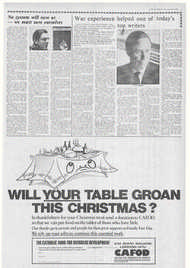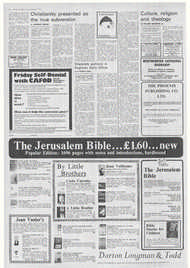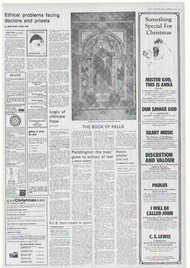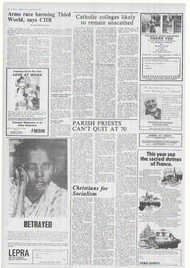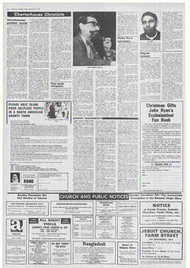Page 8, 6th December 1974
Page 8

Report an error
Noticed an error on this page?If you've noticed an error in this article please click here to report it.
Tags
Share
Related articles
It Was Interesting To Read Eddie Linden's Personal...
Opposition Faced
Catholics Who Show No Shortage Of Energy
Pax Half Century
Pax Half Century
Valerie Flessati, secretary of Pax Christi in Britain, discussing the
Catholic organisation's new magazine, "Just Peace," said in an interview with MICHAEL DUGGAN: "I don't think that a balance of fear is in keeping with a vision of God's Kingdom."
In 1867 Alfred Bernhard Nobel, the Swedish chemist, invented dynamite and said: "This will put an end to war." One hundred years later, after the horror of trench warfare, the blitz, Vietnam and continuing bloodshed in Ireland, Nobel's belief that man's cruelty to man was limited evokes from us merely a wry smile.
But where dynamite failed, the Catholic organisation Pax Christi hopes to make good. In the last few months a new magazine called "Just Peace" has appeared in parishes and schools. The tone is set in the heading with Pope Paul's words: "Peace is the fruit of anxious daily care to see that each man lives in justice as God intends."
Valerie Flessati, who at 23 is full-time secretary of Pax Christi in Britain, explained that the magazine aimed to present Catholics with issues of
• "justice" and "peace" in the light of Church teaching. Special attention is paid to the morality of indiscriminate warfare and the arms trade, to techniques of non-violence and to international issues such as conscientious objection and the persecution of minorities.
Nuclear missiles may glower menacingly in their silos but Miss Flessati is confident that even a small group such as Pax Christi — with 500 members in this country — can help to defuse them.
"If you believe in democracy or believe that human beings can determine the way they live, then it must be possible," she said. "If you believe in the Resurrection you believe that sin can be overcome."
Valerie Flessati believes that complacency over the nuclear stalemate is un-Christian. "I don't think that a balance of fear is in keeping with a vision of God's Kingdom. I don't think the balance of fear is making us more secure. It's making us less secure. 'It diverts resources from better uses — the Third World, education and so on. It doesn't really save us, in the sense that we can't use the 'deterrent' but it goes on costing money. "It's suicide. What's worth killing 40 million people for? What are we trying to save? It's wrong to rely on weapons like that without exploring to the full the other ways of bringing about peace. We're amateurs when it comes to the nonviolent solution of conflict."
One "non-violent method" to break the spiral of violence, she says, is to ensure a just society. In open conflict situations the tactics could include non-cooperation — practised in Norway and Denmark during the last war — or the deliberate adoption of non-aggressive defence in armed clashes.
Valerie Flessati points out that people arc quite used to being trained for violent defence in the Home Guard and the Territorial Army. "It's extraordinary that you shouldn't be able to imagine a situationwhere people are being trained for non-violence."
Pax Christi was founded by the Bishop of Lourdes after the Second World War to reconcile the peoples of France and Germany. In 1972 a handful of British members joined with PAX — an older peace Movement founded by Catholics who wanted to apply Christian principles to the question of war.
This year the British headquarters of Fax Christi moved to a "peace centre" in a former working men's club lent by the Dominicans in North London. The centre serves as a venue for film shows, meetings and exhibitions on themes related to peace.
Valerie Flessati says that the movement is rooted in the Church and has grown out of the Church. She regrets that most Catholics are more familiar with the Church's teachirli on "personal" than on
"social' morality even if this pattern is changing.
"Most of our members would never call themselves pacifist," she says. "But they believe that the sort of weapons we have now make a just war impossible."
She wants a cut in arms spending by the British Government, estimated to cost the average family more than £5 a week in taxes, and an end to what the French bishops have called the "devilish machine" of the arms trade.
"The arms trade is, in fact, retarding the development of
Third World countries because they think they have to compete. And their rate of growth of arms in percentage terms is higher than in developed countries.
"The money is so vitally needed for other developments. So often it's just a matter of prestige: it's not in relation to a threat, "Many of the companies making weapons do not depend solely on arms for their income. With a bit of planning workers could be phased into their other products." She added that redeployment of this kind occurred after the Second World War, when munitions factories were no longer required on the same scale.
The secretary of Fax Christi believes firmly in the concept of the "family of man." She says: "People cannot be 'foreign.' "Human beings are members of one family and Catholics should be constantly supporting efforts to make the world one, not by suppressing cultural differences but by recognising that differences arc good and that it is only by complementing each other and co-operating internationally that peace will be achieved.
"It's making sure that since people in other countries are our family it's Only sense to deal with them justly: reducing consumption of the world's resources, offering a greater share of wealth, not stockpiling weapons against them, treating them as neighbours — as we would like to he treated on the personal level . . .
"We think it's everybody' concern. As the Pope said in his New Year message: 'Peace depends on you too'." Fax Christi educates and informs Catholics through meetings, film shows, discussions and, of course, the new magazine "Just Peace." The movement has shown special interest in Northern Ireland.
But Valerie Flessati admits that it's an uphill struggle. "We're up against a lot of history. Attitudes are very deep-rooted. The greatest step forward would be if people thought it was possible to change things."
Two thousand years ago, in the upper room of a Jerusalem house, that small band of Apostles must have been thinking much the same sort of thing.
blog comments powered by Disqus








